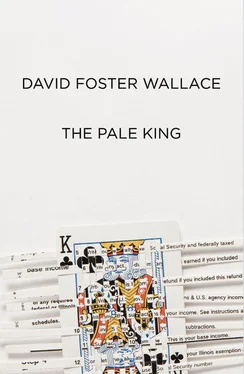‘He understood you as a person, you’re saying.’
‘What he did, right in the pink room, while I’m sitting there on the bunk and going oh my God there’s a drain in the floor, he right away told me two separate things about myself that I knew but nobody else knew. Nobody. I’m serious,’ Meredith Rand says. ‘It’s like, I couldn’t believe it. He was dead-on.’
‘…’
‘Now you’re wondering what the things are,’ she says.
Drinion does that very small thing with the angle of his head. ‘Are you saying you’d like me to ask you what they are?’
‘No way.’
‘Almost by definition, I doubt that you’d tell them to someone.’
‘Bingo. Right. No way. Not that they’re all that interesting,’ she says. ‘But he did. He knew them, and you can bet that got my attention. That made me sit up and take notice. How could it not?’
Drinion says: ‘I can understand that.’
‘Exactly. That he knew me, understood me, was interested in understanding. People always say that, understand, I understand you, please help us understand you. ’
‘I’ve said it several times, too, while we’ve been talking,’ Drinion says.
‘Do you know how many times?’
‘Nine, though I believe only four in quite the sense that you appear to be referring to, if I understand what you mean.’
‘Is that a joke?’
‘My using the word understand again just now?’
Rand makes an exasperated expression and directs it off to one side and then the other as if there were still more people at the table with them.
Drinion says: ‘Not if I follow the sense of understand you mean, which doesn’t refer to understanding a statement or somebody’s implication but more a person, which seems to me less cognitive than a matter of empathy or I think even compassion would be the word you mean by this kind of understanding.’
‘The thing,’ she says, ‘is he really did. Use whatever word you want. Nobody knew these things he told me — one of them I don’t even think I knew, really, until he just put it out there in blunt words.’
‘This made an impression,’ Drinion says helpfully.
Rand ignores him. ‘He was a natural therapist. He said it was his calling, his art. The way painting or being able to dance really well or to sit there reading the same thing for hours on end without moving or getting distracted is other people’s calling.’
‘…’
‘Would you say you have a calling?’ the POTEX asks Shane Drinion.
‘I doubt it.’
‘He wasn’t a doctor, but when he saw somebody in there he thought he could maybe help, he’d try to help them. Otherwise he was more like a security guard, he said.’
‘…’
‘One time he said he was more just like a mirror. In the intense conversations. If he seemed mean or stupid, what it really meant was that you saw yourself as mean and stupid. If one time he struck you as smart and sensitive, it meant you were smart and sensitive that day — he just showed you what was there.
‘He looked terrible, but that was also part of the power of sitting in there with him and doing these intense bits of work. He looked so sick and washed out and delicate that you never got the idea that here was this smug, normal, healthy, rich doctor judging you and being glad he wasn’t you or just seeing you as a case to resolve. It was like really talking to somebody, with him.’
‘Anyone could tell that he made a great impression on you in this difficult time, your future husband,’ Shane Drinion says.
‘Are you being ironic?’
‘No.’
‘Are you thinking, like, here’s this messed-up seventeen-year-old falling in love with the therapist-type adult figure that she thinks is the only one that understands? ’
Shane Drinion shakes his head exactly twice. ‘That’s not what I’m thinking.’ It occurs to Rand that he could conceivably be bored out of his skull and she’d have no way of telling.
‘Because that’s pathetic,’ Meredith Rand says. ‘That’s like the oldest story in the book, and however messed up you might think this is, it sure wasn’t that.’ She’s sitting up very straight now for a moment. ‘Do you know what monopsony is?’
‘I think so.’
‘What is it then?’
Shane Drinion clears his throat slightly. ‘It’s the reverse of monopoly. There’s a single buyer and multiple sellers.’
‘All right.’
‘I think bids for government contracts, such as when the Service upgraded its card readers at the La Junta center last year, are an example of a monopsonistic market.’
‘All right. Well, he taught me that one, too, although in a more of a personal context.’
‘As in a metaphor,’ Drinion says.
‘Do you see what it could have to do with loneliness?’
Another very brief moment of inward scanning. ‘I can see how it might lead to distrust, since contract-bidding situations are susceptible to rigging, dishonest cost-projections, and things like that.’
‘You’re a very literal person, did you know that?’
‘…’
‘Here’s the literal thing, then,’ Meredith Rand says. ‘Say you’re pretty, and there’s things about being pretty that you like — you get treated special, and people pay attention to you and talk about you, and if you walk in someplace you can almost feel the room change, and you like it.’
‘It’s a form of power,’ Drinion says.
‘But at the same time you also have less power,’ Meredith Rand says, ‘because the power you have is all totally connected to prettiness, and at some point you realize that the prettiness is like a kind of box you’re always in, or prison, that nobody’s ever going to see you or think about you apart from the prettiness.’
‘…’
‘It’s not like I even thought I was all that pretty,’ Meredith Rand says. ‘Especially in high school.’ She’s rolling a cigarette back and forth between her fingers but not lighting it. ‘But I sure knew everybody else thought I was pretty. Ever since like twelve, people were saying how lovely and beautiful I was, and in high school I was one of the foxes, and everybody knew who they were, and it became sort of official, socially: I was pretty, I was desirable, I had the power. Do you get this?’
‘I think so,’ Shane Drinion says.
‘Because this is what intense meant — he and I really talked about it, the prettiness. It was the first time I ever really talked about it with anybody. Especially a guy. I mean except for “You’re so beautiful, I love you” and trying to put their tongue in your ear. Like that was all you needed to hear, that you were beautiful, and you were supposed to fall over and let them boff you.’
‘…’
‘If you’re pretty,’ Meredith Rand says, ‘it can be hard to respect guys.’
‘I can understand that,’ Drinion says.
‘Because you never even get to see what they might really be like. Because the minute you’re around, they change; if they’ve decided you’re beautiful, they change. It’s like the thing in physics — if you’re there to look at the experiment, it supposedly messes up the results.’
‘There’s a paradox involved in it,’ Drinion says.
‘And except for a while you like it. You like the attention. Even if they change, you know it’s you making them change. You’re attractive, they’re attracted to you.’
‘Hence the tongues in the ear.’
‘Although with a lot of them it turns out it’s got the opposite effect. They almost avoid you. They get scared or nervous — it makes them want something, and they’re embarrassed or scared of wanting it — they can’t talk to you or even look at you, or else they start putting on a little show like Second-Knuckle Bob, this flirty sexist thing where they think they’re doing it to impress you but really it’s to impress other boys, to show they’re not afraid. And you haven’t even done or said anything to start it; all you have to do is just be there, and everybody changes. Presto change-o.’
Читать дальше












